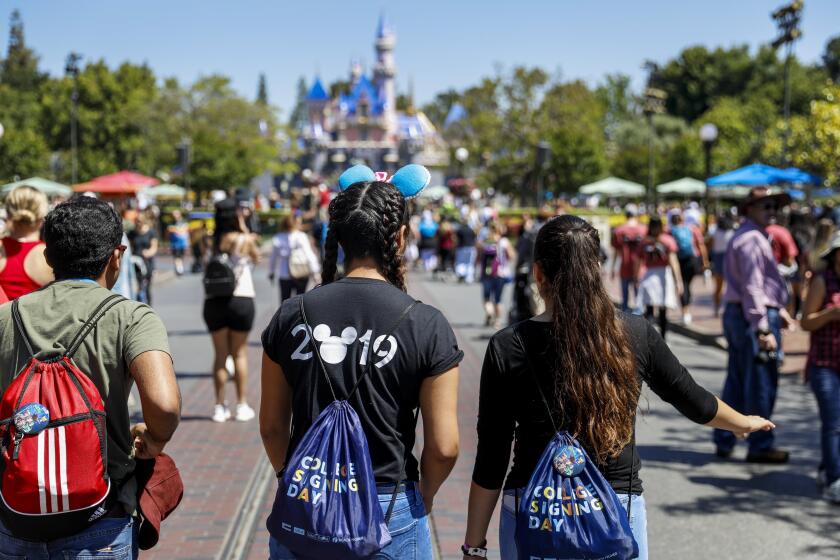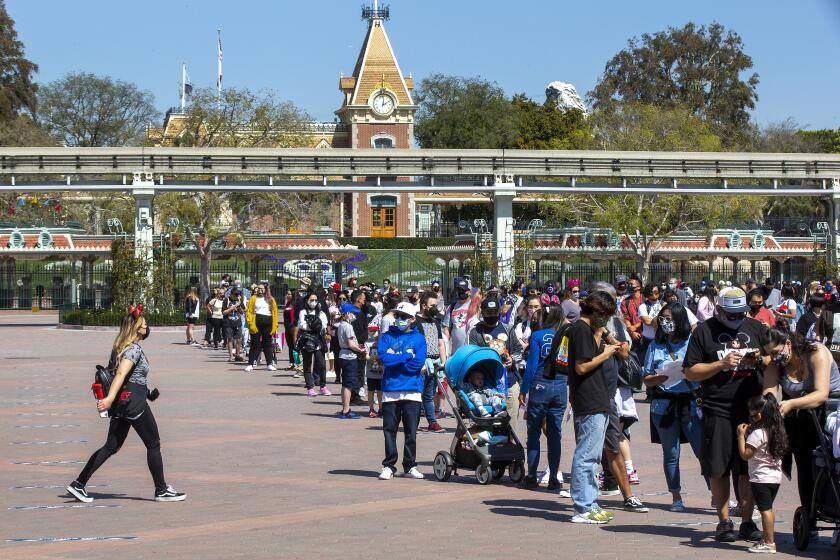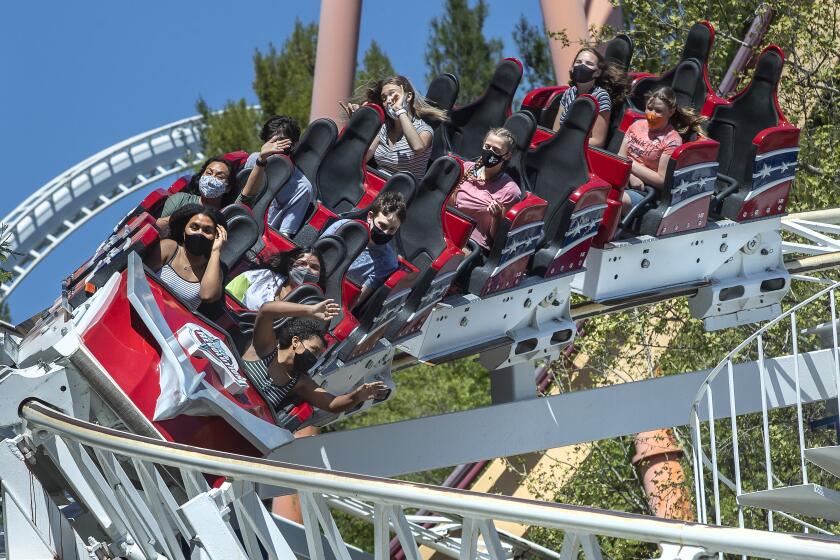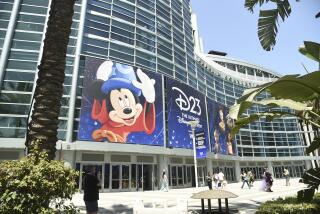Apps help theme parks boost their COVID safety — and collect data on you
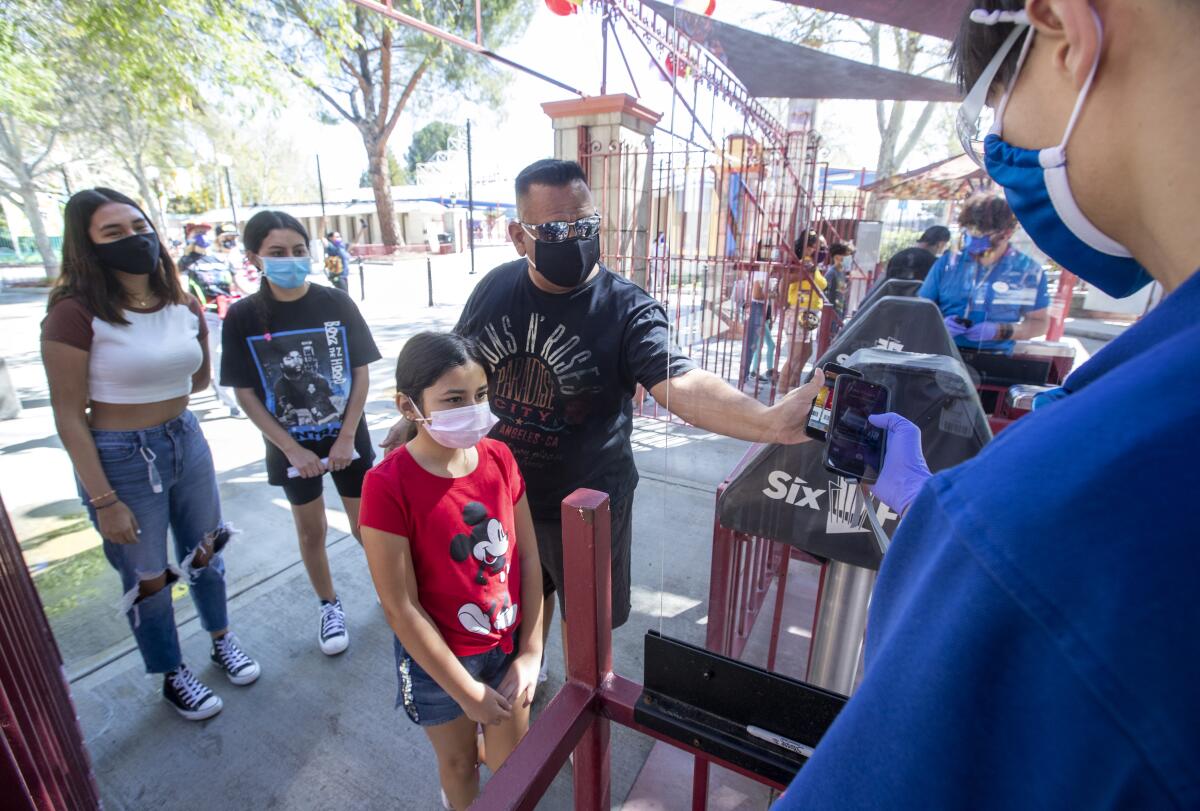
- Share via
Heading to Six Flags Magic Mountain for some gut-twisting roller coasters? Prepare to walk past a thermal camera that automatically takes your temperature.
Want to enjoy a Dole Whip at Disneyland? Have your smartphone ready to order it on the park’s app.
Trying to find your way to the Studio Tour ride at Universal Studios Hollywood? Open a map on your phone.
Theme parks have for years been relying on technology to better manage crowds, speed up the purchase of food and drinks, and eliminate gridlock around the most popular rides. Digital tickets have factored into that. So has the practice of tracking guests’ locations within a park via a phone app.
Now, after a yearlong closure due to the COVID-19 pandemic, Southern California’s theme parks are reopening with new safety protocols — many of which lean heavily on such technology. That’s helping the parks lower the risk of spreading the coronavirus and, at the same time, collect more information about their visitors.
How and when can you get tickets to Disneyland, Universal Studios Hollywood, Six Flags Magic Mountain and Knott’s Berry Farm? Will all the rides be available? What’s different?
At theme parks, the biggest risk of spreading the virus is also the biggest headache: long waits in packed crowds. Technology such as touchless payment systems to order food and apps to schedule times to ride attractions or make dining reservations is meant to reduce both.
“In the past several months, our tech teams have accelerated our move to digital in a big way,” Disneyland spokesperson Liz Jaeger said.
Industry experts say the trend is global, with theme parks in Asia and Europe also pushing the increased use of technology. China’s Shanghai Haichang Ocean Park reopened last year accepting only cashless payments. Legoland in Carlsbad reopened April 1, also accepting only cashless payments.
“COVID forced this because people have been away from each other and are now back,” said Dennis Speigel, president of International Theme Park Services. “But now we are going to see more and more of it.”
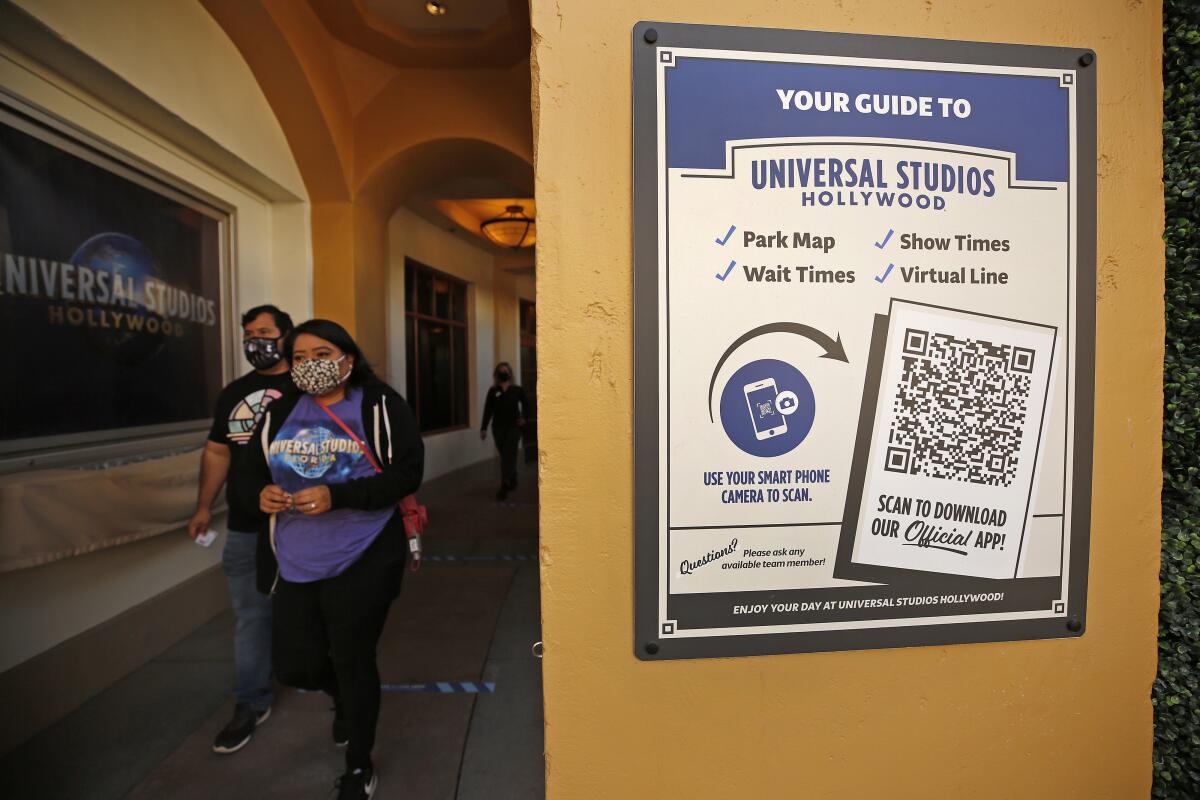
Privacy advocates say the trend also gives theme parks greater opportunity to use the visitors’ information to upsell them on merchandise, food and drinks, among other purchases. They also worry that the personal and financial information collected from parkgoers can be leaked or shared in unexpected ways.
“While theme parks may be pushing smartphone purchases as a form of convenience or even as a health measure, we should be very aware of the fact that this is also a huge opportunity for them to make a grab at our data, using it for everything from marketing to enforcement of park rules,” said Evan Greer, director of the digital rights group Fight for the Future.
Many theme park apps’ privacy policies acknowledge that the parks may use information collected by the apps for marketing purposes. But park officials say the apps give users the option to block access to some information, such as their location within the park.
“We take privacy very seriously to ensure that our guests and their personal data are securely protected,” Universal Studios Hollywood spokesperson Audrey Eig said.
How mounting hours, crashing web pages and disappointing updates derailed our TV critic’s long-delayed journey to the happiest #*&$%!! place on Earth.
Theme parks prefer touchless purchasing systems such as Apple Pay because parkgoers tend to spend more that way than they do when they have to reach into a wallet or a purse to pull out cash or a credit card, Speigel said.
An industry study found that at water parks and arcades, spending jumped 30% to 40% when touchless systems replaced traditional methods of paying.
“It’s truly one of the best things in the industry to come out of the COVID” pandemic, Speigel said.
California theme parks were given permission by the state to reopen starting April 1, thanks to a decrease in new coronavirus cases and the rollout of vaccines. But state health officials have imposed a slew of health protocols, including limiting attendance, requiring six feet of separation in queues and mandating that visitors wear masks except when eating.
A greater use of smartphone apps and other technology can help the parks meet the state health protocols, especially the requirement that visitors maintain physical distance from one another, theme park officials say.
At Six Flags Magic Mountain in Valencia, visitors walking from the parking lot to the front gate pass through a small building where thermal cameras take their temperatures without making them break their stride. The visitors then stroll past a digital scanning device that checks them for hidden weapons, eliminating the need to stop for a security search.
“The best thing is it’s not holding up the line,” park spokesperson Jerry Certonio said.
Six Flags Magic Mountain’s COVID-19 safety measures begin at the theme park’s front gates, extend to rides and even affect the men’s bathrooms. Thrill seekers visiting Friday didn’t seem to mind.
At Disneyland and Disney California Adventure Park, every restaurant and shop offers touchless payment options to eliminate the need to exchange cash and credit cards with a Disney worker. Many of the restaurants also allow visitors to order food from the Disneyland app, eliminating the need to stand in a queue or a crowd while waiting for the food.
At the Disneyland Resort, visitors who want to enter a shop that has already reached capacity can give their name and phone number to a Disney employee who will send them a text message when they can return.
Six Flags Magic Mountain has increased the use of touchless payment options to six eateries in the last few weeks, up from three, with plans to add more in the future.
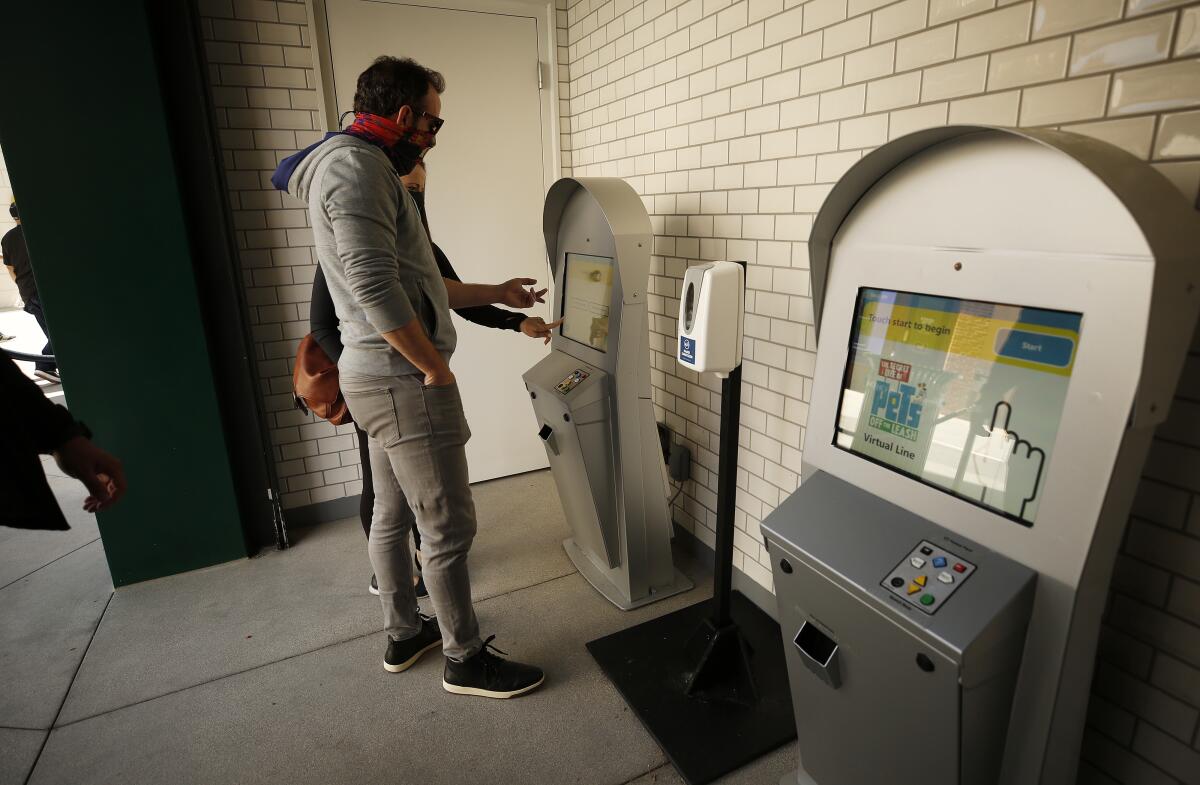
At Universal Studios Hollywood, visitors can still get a paper map at the gate but are encouraged to use their smartphone camera to scan a QR code emblazoned on signs throughout the park. The code causes a map of the park to display on the phone when the visitor downloads the park’s app. That should cut down on aimless intermixing with other visitors in the park. QR codes are also used at the Disneyland Resort to open digital menus at restaurants.
Visitors to the parks seem to like the changes.
Universal Studios Hollywood reopened Thursday with its first virtual line for its newest attraction, The Secret Life of Pets: Off the Leash. Parkgoers can use their smartphone app or a kiosk near the ride to schedule a time to ride the attraction. When the scheduled time arrives, the visitor can show a paper ticket or a QR code on their phone and jump on the ride.
“I think it makes perfect sense,” said Holly Lee, an Orange County resident who visited the park Thursday. “It means you don’t have people crowding around in front of the ride.”
Disney announced a plan to add new attractions, shops and restaurants inside Disneyland by redeveloping existing areas of the Anaheim resort.

